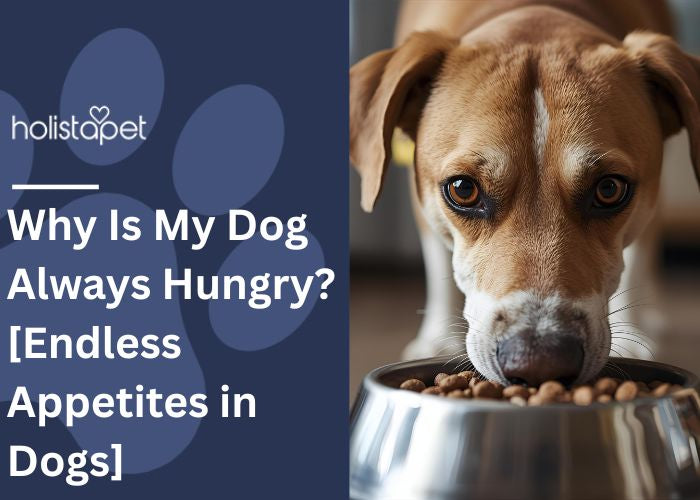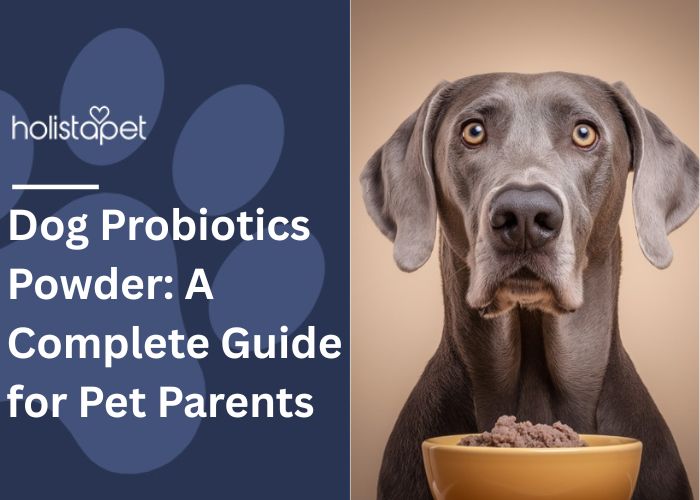You feed your dog a full meal, yet minutes later, those pleading eyes follow you to the kitchen. You wonder, “Why is my dog always hungry?” and the truth is that constant hunger can signal instinct, learned behavior, or even an underlying health condition.
Paying attention to changes in eating habits helps protect your pup’s well-being. Stay alert, watch weight, and know when extra hunger deserves a closer look.
Normal vs. Excessive Hunger in Dogs

Normal hunger aligns with your dog’s size, age, and activity, showing steady meals and healthy weight. However, appetite can also shift when dogs age as metabolism and energy needs change. Excessive hunger appears when your pup constantly begs, raids trash, or eats too quickly.
When this behavior comes with weight loss, low energy, or increased thirst, it may signal medical problems. Understanding the difference helps you respond early, manage food intake properly. It also tells you when a veterinary check becomes necessary for your dog’s health.
Common Reasons Dogs Always Want Food
If your dog won’t stop eating, the cause may not be simple. Constant appetite often connects to natural instincts, begging habits, poor diet, or age-related needs.
Understanding these factors helps you decide if the behavior is harmless or a red flag. Knowing the difference protects your pup’s health and guides smarter choices.
Natural Instincts and Survival Drive
Your dog’s push for food often links back to survival instincts from wild ancestors. In the past, dogs ate whenever food appeared, and that drive still fuels behaviors like begging or gulping meals. Some breeds feel this urge more strongly, especially retrievers.
Structured feeding routines give your dog clear meal times. Puzzle feeders make eating more engaging. Enrichment activities add stimulation. Together, these tools keep your pup satisfied and reduce constant hunger-driven behavior.
Learned Behavior and Begging Habits
Your dog may seem hungry because begging worked before. A scrap from the table or a treat after whining quickly teaches that persistence pays off. Even scolding can reward the behavior with attention. To break the cycle, pet parents should ignore begging and instead reward calm alternatives.
Feed your dog before family meals to reduce begging. Use enrichment toys to keep them busy. These steps reshape habits, teach healthier patterns, and ease constant food-seeking. This is especially helpful for dog owners struggling with persistent begging.
Inadequate Nutrition or Poor-Quality Diet
When meals lack proper nutrients, your dog’s diet may keep signaling for more food. A dog’s diet filled with fillers or low-quality ingredients often fails to satisfy, leaving your pup scavenging or begging.
Some low-grade dry or wet food formulas rely heavily on fillers and additives rather than quality proteins. They can leave dogs feeling unsatisfied and constantly hungry.
Signs like dull coats, skin irritation, or irregular stools can appear. Switching to balanced, digestible food supports satiety, boosts energy, and reduces hunger. Work with your vet if concerns persist despite dietary changes.
Age, Breed Size, and Life Stage
A dog’s hunger often changes with age, size, and activity. Puppies burn through calories quickly and may seem insatiable. Senior dogs can develop stronger appetites if health issues affect metabolism.
Large and active breeds often require more protein and fiber to stay satisfied. Paying attention to life stage and breed needs helps you manage food intake and keep your pup’s appetite balanced.
Medical Causes Behind Constant Hunger

Sometimes “why does my dog always want to eat” points to medical issues. Conditions like diabetes, thyroid problems, Cushing’s disease, digestive disorders, or parasites can drive constant appetite.
Spotting these early matters. If hunger comes with weight loss, thirst, or digestive changes, schedule a veterinary check to protect health.
Diabetes and Blood Sugar Imbalances
Constant hunger may signal diabetes mellitus. Your dog’s body struggles to use glucose, so cells feel starved even with high blood sugar. Signs include weight loss, thirst, and frequent urination.
Diagnosis needs vet testing, with treatment often involving insulin and a structured diet. Monitoring appetite and weight supports long-term health.
Thyroid Disorders (Hyperthyroidism or Hypothyroidism)
Thyroid problems can change your dog’s appetite in different ways. Hyperthyroidism speeds metabolism, causing constant hunger, weight loss, and thirst.
Hypothyroidism slows metabolism, leading to weight gain and lethargy. But extra medication can mimic hyperthyroid signs. Since symptoms overlap, blood tests are vital. Treatment balances hormones, restores energy, and regulates eating.
Cushing’s Disease (Overproduction of Cortisol)
Cushing’s disease happens when your dog’s body makes too much cortisol, usually from a pituitary tumor. It causes extreme hunger, thirst, and a pot-bellied look. Other signs include panting, thinning skin, and hair loss.
Many confuse it with aging. Vets confirm with tests, and treatment may involve medication or surgery. Early detection improves comfort and quality of life.
Digestive Issues and Malabsorption Problems
Digestive troubles can make your canine family member eat nonstop yet still lose weight. Exocrine pancreatic insufficiency limits digestive enzymes, leaving nutrients unabsorbed. Signs include greasy stools, gas, and muscle loss.
Other gastrointestinal disorders or parasites also block absorption. Vets diagnose the cause, then treat with enzymes, special diets, or deworming to restore nutrition and reduce hunger.
Parasites That Interfere With Nutrient Absorption
Intestinal parasites steal nutrients and leave your dog constantly hungry, even with regular meals. Roundworms, hookworms, tapeworms, or Giardia cause weight loss, poor coat, and digestive upset.
Puppies may show bloated bellies, while adults beg for food persistently and grow weak. Diagnosis uses fecal tests. Treatment includes deworming, hydration, and gut support. Prevention relies on clean environments and regular vet visits.
Behavioral and Emotional Factors

Sometimes “why does my dog always want to eat” is less about physical need and more about feelings. Stress, boredom, or lack of enrichment can push dogs toward food-seeking.
Recognizing these emotional triggers helps you adjust routines. You can provide stimulation and manage hunger-driven behavior before it becomes unhealthy.
Stress or Anxiety-Driven Eating
Dogs often use food to handle stress or upset feelings. Loud noises, routine changes, or fear of being alone can trigger food-seeking. Signs include pacing, whining, or clinginess.
Giving treats during stress strengthens the habit. Instead, create routines, use puzzle feeders, and reward calm behavior. More serious cases may need calming aids or veterinary help.
Boredom and Lack of Enrichment
When life feels dull, your dog may look to food for excitement. Begging, scavenging, or raiding trash often replace missing play or walks.
Enrichment toys, puzzle feeders, and training give healthier outlets. Adding variety keeps boredom-driven hunger low and helps your pup stay engaged, calm, and satisfied.
Is Overeating Dangerous for Dogs?
Overeating puts a hungry dog at risk for obesity, which can shorten lifespan and trigger serious health problems. Extra weight stresses joints, raises blood pressure, and increases the chance of diabetes mellitus. Fat tissue releases chemicals that strain organs and weaken immunity.
If you wonder, “why does my dog always want food,” remember that too much eating isn’t harmless. Managing weight early protects mobility, supports energy, and helps your pup enjoy more active years.
How to Manage a Dog That’s Always Hungry

There are many ways to manage constant hunger in your pup. Feeding schedules, nutrient-dense foods, and added fiber or protein boost fullness. Enrichment toys, slow-feeders, and consistent training reduce appetite and support healthier habits.
Establish Consistent Feeding Schedules
Feeding your dog at set times teaches their body when to expect meals. This structure reduces begging and supports digestion. Adult dogs usually need two meals, while puppies need smaller, frequent portions.
Limit meals to 15–20 minutes, avoid constant snacking, and use automatic feeders to keep routines reliable.
Choose High-Quality, Nutrient-Dense Foods
Your dog feels fuller and healthier when meals provide real nutrition instead of fillers. Choose high-quality commercial dog foods. Look for whole proteins, healthy fats, and fiber as main ingredients. These nutrients work together to support satiety and steady energy.
Avoid vague by-products or additives with no value. Nutrient-dense foods curb hunger, boost digestion, and improve coat health. Transition slowly and monitor body condition for lasting results.
Add Fiber and Protein for Satiety
Fiber and protein keep your dog full after meals. Protein builds muscle and digests slowly, while fiber adds bulk, aids digestion, and steadies blood sugar. Together, they cut begging and overeating.
Pick foods with quality proteins and fiber sources like pumpkin. Increase fiber slowly and track weight for balanced results.
Use Enrichment Toys and Slow-Feeders
Slow-feeders and enrichment toys stretch mealtime and engage your dog’s brain. Instead of gulping food, your pup works through puzzles, easing overeating and boosting fullness.
Snuffle mats, treat-dispensing balls, and puzzle bowls also fight boredom and stress. Rotate toys and match them to skill. These methods aid digestion, reduce begging, and make meals rewarding.
Reinforce Training to Discourage Begging
Begging continues if rewarded, even once. Ignoring it teaches your dog it doesn’t work. Reward calm actions like sitting or resting instead. Feeding before family meals lowers temptation. Keep training consistent across your household, since one person sneaking scraps ruins progress. With patience, your dog learns healthier habits and less food-seeking.
Holistapet Products That May Help
Holistapet offers natural solutions that can support your dog’s appetite and overall balance.
- Multivitamin Soft Chews for Dogs – These chews contain essential vitamins and minerals. They help cover nutritional gaps, steady appetite, and promote energy. They are ideal for pups that seem hungry because their diet may not fully meet daily needs.
- Probiotic Soft Chews – These chews aid digestion and boost nutrient absorption. They also balance gut flora and reduce food-seeking linked to poor digestive health. Find out more about the benefits of probiotics for dogs here.
- Calming Chews for Dogs – These chews use soothing ingredients to ease stress-driven eating. They promote relaxation and encourage calmer habits around food.
When to See a Vet About Excessive Hunger
Schedule a vet visit if your dog shows signs of increased appetite along with weight loss, vomiting, diarrhea, or lethargy. Constant hunger paired with thirst or urination may signal diabetes or Cushing’s disease. Digestive troubles, greasy stools, or coat changes also raise concern. Early evaluation ensures proper diagnosis, prevents complications, and protects your pet's health.
FAQs – Hunger in Dogs
How do I know if I’m feeding my dog enough?
Check weight, energy, and body condition. Ribs should be felt but not seen, showing balanced feeding.
Can switching dog foods help reduce hunger behavior?
Yes, nutrient-dense food keeps dogs fuller longer. Transition gradually, monitor stools, and ensure protein and fiber meet daily needs for better satiety.
What should I feed a dog that’s always hungry?
Choose balanced meals rich in protein and fiber. Avoid fillers and keep treats limited to maintain satiety, support energy, and manage appetite.
How do I know if my dog’s hunger is behavioral or medical?
Behavioral hunger shows with begging or boredom. Medical hunger pairs with weight loss, thirst, or digestive issues. Consult a vet for clearer guidance or if symptoms persist.
Final Thoughts – Why Are Some Dogs Always Hungry?
Some dogs seem endlessly hungry because of instinct, behavior, or health issues. Balanced pet nutrition, structured feeding, and enrichment can help manage appetite. Timely vet care addresses medical concerns.
Holistapet products like Multivitamin, Probiotic, and Calming Chews offer safe support for appetite and wellbeing. With healthy food, clear routines, and the right supplements, you can keep your pup satisfied, comfortable, and ready for a long, active life.


 CBD Oil for Dogs - Fast Acting
CBD Oil for Dogs - Fast Acting
 Chicken Flavored CBD Oil For Dogs - Easy Dose
Chicken Flavored CBD Oil For Dogs - Easy Dose
 Salmon Flavored CBD Oil For Dogs - Highly Rated
Salmon Flavored CBD Oil For Dogs - Highly Rated
 CBG Oil for Dogs and Cats - Loved by Thousands
CBG Oil for Dogs and Cats - Loved by Thousands




Leave a comment
All comments are moderated before being published.
This site is protected by hCaptcha and the hCaptcha Privacy Policy and Terms of Service apply.